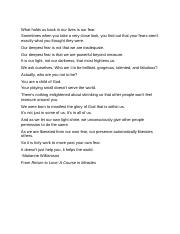Fear, as a universal and multifaceted emotion, often provokes profound introspection within the human experience. In the realm of Baha’i teachings, fear serves not only as a personal barrier but also as a collective hindrance to societal advancement. The question “What do you fear most?” invites us to explore the intricate tapestry of our fears, recognizing how they shape our identities and influence our actions. This reflection will delve into the underlying reasons for our fears through a Baha’i lens, illuminating how these teachings can provide solace and encourage personal growth.
Understanding the Nature of Fear
Fear arises from a primordial instinct designed to protect individuals from perceived threats. In various forms—fear of failure, rejection, or even existential anxieties—these emotions stem from a place of uncertainty. The Baha’i faith asserts that challenges faced by humanity are often reflections of deeper spiritual realities. By addressing the fundamental nature of fear, adherents can begin to disentangle these emotions from their essence, aiding in the pursuit of an enlightened existence.
At its core, fear often emerges from a lack of knowledge or understanding. The Baha’i teachings emphasize the significance of education and the acquisition of knowledge. “The foundation of all human excellence is laid upon the education and training of children,” Abdu’l-Baha wrote. Thus, by cultivating knowledge, individuals can alleviate the sources of their fear. When believers confront their ignorance and seek enlightenment, they are better equipped to dismantle the illusions that contribute to their apprehensions.
The Diversity of Fears
Examining the spectrum of fears reveals cultural, social, and personal dimensions that often intersect. People fear judgment from their communities, fear of violence or unrest, and fear of personal failures. Each fear reflects a unique narrative influenced by the surrounding environment and societal values. Baha’is are called to transcend these societal limitations, fostering an attitude of unity and compassion. The teachings constantly reinforce that humanity’s progress is reliant upon the eradication of prejudice and the advancement of collective consciousness.
Moreover, fear can engender isolation. The quest for belonging is rooted in human nature, and the fear of exclusion is a powerful motivator for conformity. However, the Baha’i teachings propose that true belonging cannot be achieved through the mere avoidance of fear. Instead, it requires an embrace of universal brotherhood, recognizing the inherent value of every individual. By fostering compassion and understanding, individuals can overcome their fears of isolation, leading to a more unified and harmonious society.
Addressing Fear through Spiritual Empowerment
The Baha’i perspective posits that spiritual development is a vital antidote to fear. Through regular prayer, meditation, and reflection, individuals can cultivate an inner strength that diminishes the grip of fear on their lives. Baha’is believe that every soul has access to divine guidance, and engaging with this inner voice can illuminate pathways through the shadows of fear.
Moreover, engaging with the concept of service acts as a transformative agent in overcoming fear. The act of selflessness breaks the cycle of self-centered thoughts that often fuel anxiety. By serving others, individuals step outside their own fears and bestow love and compassion onto those around them. This shift in focus toward the well-being of others cultivates resilience, enabling individuals to navigate the tribulations of life with grace.
Reframing Fear: A Pathway to Growth
One of the most profound teachings within the Baha’i faith is the idea that challenges, including fear, serve a higher purpose. Rather than viewing fear as a deterrent, individuals are encouraged to reframe their perceptions of fear as opportunities for growth and self-discovery. Each fear can act as a mirror, illuminating areas in life that require attention and healing.
This reframing aligns with the Baha’i principle of the oneness of humanity, asserting that personal growth contributes to societal progress. As individuals confront their fears, they not only transform their lives but also contribute positively to the social fabric of humanity. The potential for growth through adversity is a theme repeated throughout Baha’i teachings, emphasizing that the journey toward inner peace often necessitates facing and embracing one’s fears.
The Role of Community in Alleviating Fear
Community engagement plays a pivotal role in overcoming fear. The Baha’i teachings underscore the importance of building vibrant, supportive communities grounded in unity and cooperation. In these environments, individuals can share their fears openly, finding solace in the understanding and empathy of fellow believers. Collective efforts to address common fears enable members to support one another, fostering resilience in the face of adversity.
Baha’is are encouraged to create spaces where dialogue can flourish, allowing communities to address social fears such as inequality, injustice, and conflict. By collaboratively working towards the elimination of these fears, individuals participate in a larger movement toward the greater good—an essential aspect of the Baha’i mission.
Conclusion: Embracing Fear as a Catalyst for Transformation
Ultimately, the reflection on fear within the Baha’i framework moves beyond the personal and touches on the collective. Fears, while often daunting, are integral to the process of spiritual and social evolution. By understanding, confronting, and reframing our fears through prayer, knowledge, and community engagement, we align ourselves with a broader vision of humanity’s shared destiny.
As individuals work to transcend their fear, they participate in the collective elevation of consciousness that serves as the bedrock for a just and peaceful world. Thus, the exploration of personal fears transcends individual experience and becomes a powerful catalyst for communal transformation—an embodiment of the Baha’i teachings that implore humanity to rise above fear and realize its fullest potential.
